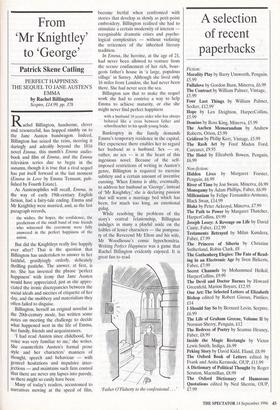From `Mr Knightley' to 'George'
Patrick Skene Catling PERFECT HAPPINESS: THE SEQUEL TO JANE AUSTEN'S EMMA by Rachel Billington Sceptre, £14.99, pp. 378 Rachel Billington, handsome, clever and resourceful, has hopped nimbly on to the Jane Austen bandwagon. Indeed, Billington has seized the reins, steering it daringly and adroitly beyond the 1816 novel Emma, this month's Emma audio- book and film of Emma, and the Emma television series due to begin in the autumn, though it is true that a rival sequel has put itself forward at the last moment (Emma in Love by Emma Tennant, pub- lished by Fourth Estate).
As Austenophiles will recall, Emma, in the way of early 19th-century English fiction, had a fairy-tale ending. Emma and Mr Knightley were married, and, as the last paragraph records,
the wishes, the hopes, the confidence, the predictions of the small band of true friends who witnessed the ceremony were fully answered in the perfect happiness of the union.
But did the Knightleys really live happily ever after? That is the question that Billington has undertaken to answer in her faithful, gratifyingly orderly, delicately thrilling pastiche. The answer, at first, is no. She has invested the phrase 'perfect happiness' with irony that Jane Austen would have appreciated, just as she appre- ciated the ironic discrepancies between the social ideals and niceties of etiquette of her day, and the snobbery and materialism they often failed to disguise. Billington, herself an original novelist in the 20th-century mode, has written some notes on meeting the challenge to decide what happened next in the life of Emma, her family, friends and acquaintances.
'I had read Austen since childhood, her voice was very familiar to me,' she writes. She counterfeits Austen's formal prose style and her characters' manners of thought, speech and behaviour — with genteel hesitations and impulsive inter- jections — and maintains such firm control that there are never any lapses into parody, as there might so easily have been.
Many of today's readers, accustomed to narratives moving at the speed of film, become fretful when confronted with stories that develop as slowly as petit-point embroidery. Billington realised she had to stimulate a certain modernity of interest recognisable dramatic crises and psycho- logical complexities — without violating the reticences of the inherited literary tradition.
In Emma, the heroine, at the age of 21, had never been allowed to venture from the secure confinement of her rich, bour- geois father's house in 'a large, populous village' in Surrey. Although she lived only 16 miles from London, she had never been there. She had never seen the sea.
Billington saw that to make the sequel work she had to contrive a way to help Emma to achieve maturity, or else she might never find perfect happiness
with a husband 16 years older who has always behaved like a cross between father and schoolteacher to his spoilt young bride.
Bankruptcy in the family demands Emma's temporary residence in the capital. Her experience there enables her to regard her husband as a husband. Sex — or, rather, no sex — is at the heart of this ingenious novel. Because of the self- imposed restrictions of writing in Austen's genre, Billington is required to exercise subtlety and a certain amount of inventive cunning. When Emma is able, eventually, to address her husband as 'George', instead of 'Mr Knightley,' she is declaring passion that will warm a marriage bed which has been, for much too long, an emotional gulag.
While resolving. the problems of -the story's central relationship, Billington indulges in many a playful aside on the foibles of lesser characters — the pomposi- ty of the Reverend Mr Elton and his wife, Mr Woodhouse's comic hypochondria. Writing Perfect Happiness was a game that Rachel Billington evidently enjoyed, It is great fun to read.
'Father O'Flaherly to the confessional . .


































































 Previous page
Previous page